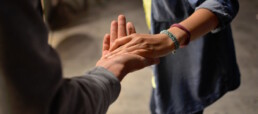How Refugee Women Are Being Supported During COVID-19
The obstacles faced by female refugee claimants upon arrival and resettlement in Canada are intensified by the pandemic. Evidence suggests that refugee women can be especially vulnerable to partner violence due to the complex processes of migrating and resettling, which can include shifts in power dynamics. In addition to violence, unanticipated social and economic obstacles contribute to family conflict and stress.
Language barriers and an incomprehension of their rights often isolate refugee women, and cause them to stay in unsafe situations. According to Stats Canada, immigrants, including refugees, are almost twice as likely to worry about the possibility of violence in the home due to COVID-19 than their Canadian-born counterparts. The pandemic has resulted in a separation from loved ones across the border, severed social ties, lost employment, and health concerns. By reducing the capacity for community and increasing familial hardships, COVID-19 has intensified the risk of violence, stress, and conflict faced by female refugee claimants in Canada.
However, members of the community have stepped up to challenge these repercussions. The COVID-19 Women’s Initiative (CWI), a non-profit student-led organization, has started an awareness campaign and fundraiser for women’s resources.
“We initially started hearing about the increase in the incidence of domestic violence as the COVID-19 pandemic progressed, [and] that women’s shelters were becoming overwhelmed and underfunded. (…) There was a concern that women who needed help were being turned away and potentially bound to the same home as their abuser,” explains Karlee Searle and Aman Dhaliwal, the University of Toronto students behind the organization. “As medical students, we knew that we could not be involved on the front lines, but felt a strong desire to help out in our community to address the gender disparities being exacerbated by the pandemic.”
With 300 volunteers across Canada, the CWI has currently raised $17,000 to help women’s shelters, including more than $2500 on their Ottawa-based fundraiser alone.
Another initiative is the Carty House, a local non-profit organization that “provides accommodation and material, financial, and psychological supports” for female refugee claimants in Ottawa. The Carty House is home to ten refugee women, some of whom have fled domestic violence and abuse.
“We are trying to support the women as best we can to ensure they feel safe, secure and at home,” says Louise Ebeltoft, Manager of Operations and Refugee Services at Carty House. “[The hold that the IRB has put on hearings] is very disappointing and frustrating for our residents, who were already having to deal with long wait times. [It] puts an extra burden on someone who wants to move on to starting a new life in Canada.”
Due to the financial restraints of the pandemic, the Carty House put out a call for help to the community. The response exceeded their expectations, raising $20,000 in six weeks.
In a time when so many are struggling, the communal generosity toward both COVID-19 fundraisers is notable. This pandemic has enforced the obstacles faced by refugee women, but with the community beside them, these obstacles will not be faced alone.
Sources
Sepali Guruge, Brenda Roche & Cristina Catallo, “Violence against Women: An Exploration of the Physical and Mental Health Trends among Immigrant and Refugee Women in Canada” (2012) 2012: 434592 Nursing Research & Practice at 2.
“How immigration status can affect women in situations of violence or abuse,” online: Canadian Council for Refugees <https://ccrweb.ca/en/how-immigration-status-can-affect-women-situations-violence>.
Sébastien LaRochelle-Côté & Sharanjit Uppal, “The social and economic concerns of immigrants during the
COVID-19 pandemic” (1 May 2020), online: Statcan COVID-19: Data to Insights for a Better Canada <https://www150.statcan.gc.ca/n1/pub/45-28-0001/2020001/article/00012-eng.pdf>.
“About Us,” online: COVID-19 Women’s Initiative<https://covidwi.com/>.
“About Us,” online: Carty House<https://cartyhouse.org/about-us/>.
Omar Dabaghi-Pacheco, “Refugee women overwhelmed by support during pandemic” (18 May 2020), online: CBC News <https://www.cbc.ca/news/canada/ottawa/refugee-women-support-covid19-ottawa-pandemic-1.5570812?fbclid=IwAR2-rAmRQhzFFRv2fBl3ker1zZfYjBQmpYVKL-aCnrCo_aVrXHQhx2lDGEY>.
“About Us,” online: Carty House<https://cartyhouse.org/about-us/>.
Omar Dabaghi-Pacheco, “Refugee women overwhelmed by support during pandemic” (18 May 2020), online: CBC News <https://www.cbc.ca/news/canada/ottawa/refugee-women-support-covid19-ottawa-pandemic-1.5570812?fbclid=IwAR2-rAmRQhzFFRv2fBl3ker1zZfYjBQmpYVKL-aCnrCo_aVrXHQhx2lDGEY>.
Share this article
Arghavan Gerami
Arghavan Gerami is the Founder and Senior Counsel at Gerami Law Professional Corporation ('PC'), a full-service immigration law firm in Ottawa, Ontario. Since 2011, Ms. Gerami has focused her practice on immigration and refugee litigation. Prior to that, Ms. Gerami worked at the Ministry of Attorney General and the Department of Justice and had the privilege of serving the Honourable Mr. Justice M. Evans at the Federal Court of Appeal on immigration and administrative law appeals. Ms. Gerami contributes to the Immigration Law Section of the Canadian Bar Association, the Canadian Association of Refugee Lawyers, and the United Nations High Commissioner for Refugees. Ms. Gerami has also published numerous journal articles and presented at various immigration and refugee law conferences and events across Canada.

